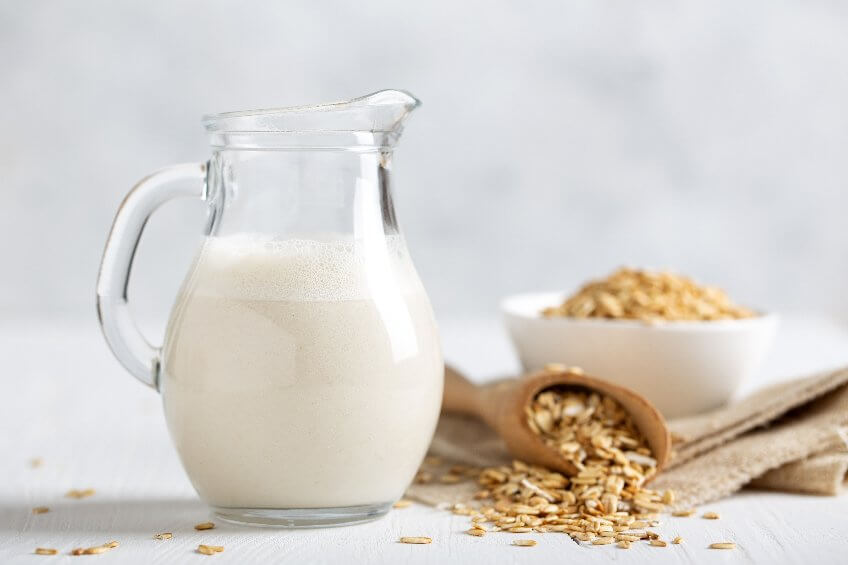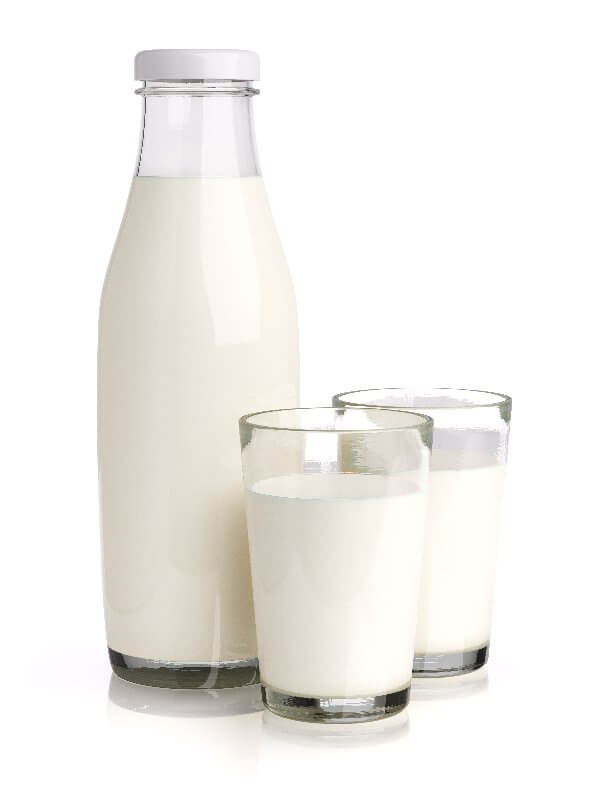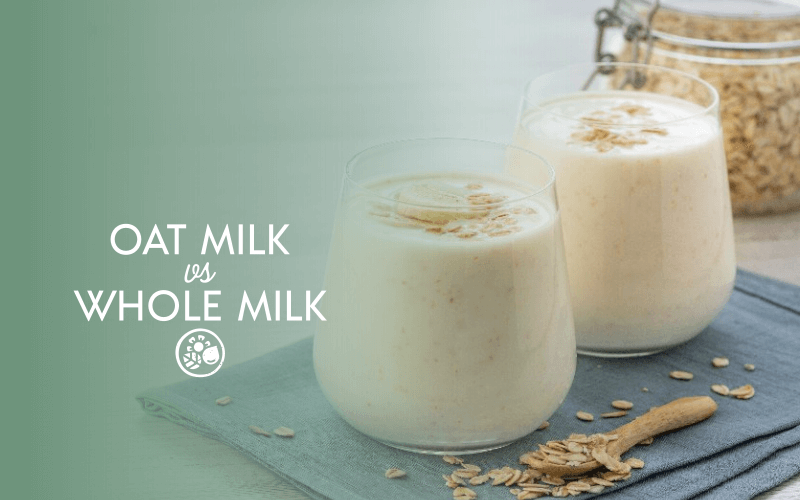If regular old dairy milk just doesn’t cut it for you anymore then there’s no shortage of plant-based milk alternatives to choose from. Whether it be milk made from almonds, soy, cashews, hemp, or even flaxseed, milk alternatives are abundant; and they each have unique benefits that you can’t get from whole dairy milk. In this article we’ll be focusing on oat milk in particular as we compare oat milk vs whole milk. By the end of this article you should have everything you need to make an educated decision between the two.
In short, the difference between oat milk vs whole milk is that oat milk is lactose-free, vegan friendly, and contains less saturated fat, cholesterol, and sugar than whole milk. Oat milk also contains fiber. Whole milk, on the other hand, contains more protein and vitamins & minerals.
Let’s elaborate on these differences further.
All About Oat Milk
Oat milk is a plant-based milk alternative that is quickly gaining popularity in coffee shops, cafes, and specialty food markets.

It is made by combining oats with water and blending it into a fine consistency. According to the All Recipes website, enzymes are then added to help break down the oats further. It is then filtered to remove the oat bran. What remains is a smooth, creamy beverage that can be used in nearly every way whole milk can.
Oat milk can be made at home if you have any oats laying around, or it can be purchased in stores. The most-reviewed oat milk on Amazon.com is the Califia Farms brand, although other brands can be purchased online or in stores such as Trader Joe’s.
Some of the ways in which oat milk can be used include:
- Frothing and steaming for use in espressos
- Added to coffee and tea
- Used in cereals and oatmeal
- Enjoyed on its own as a beverage
What’s more, oat milk can be used as a substitute for whole milk in cooking and baking recipes, making it ideal for those who choose to exclude animal-based products from their diet.
What About Whole Milk?
Dairy-based milk comes in several varieties of its own, but for this comparison we will be focusing on whole milk.

One of the biggest differences between oat milk vs whole milk is how it’s produced. Whole milk is the byproduct of cows and is pasteurized to remove harmful bacteria. It is also homogenized to emulsify the fat so that it does not separate from the liquid.
The main difference between whole milk and other types of dairy milks (such as skim milk) is that whole milk has not had any of its fat removed. Reduced-fat milk has had as much as 98% of its fat removed, and skim milk has had all of its fat removed.
As a result, whole milk is creamier and more flavorful, but it contains more calories and fat than the skim and reduced-fat varieties.
Oat Milk VS Whole Milk
Now that we’ve done a brief rundown on each, let’s have a look at how these two milk products compare with each other.
Difference In Taste
The first question you may have about oat milk is if it tastes anything like whole milk.
Reviews are mixed, but the general consensus seems to be that although oat milk doesn’t taste exactly like whole milk, it is the closest of all the plant-based milk varieties as it is thicker and creamier than almond, soy, and hemp milk.
Many reviewers have pointed out that oat milk froths just as much as whole milk does and the difference in taste isn’t even noticeable when used as a creamer. That said, not everyone feels the same way. Others have mentioned that oat milk has a slightly nutty flavor that isn’t consistent with whole milk.
Shelf Life
One big advantage that oat milk has over whole milk is its shelf life.
Seeing as how whole milk is a dairy product, it spoils rather quickly. Unopened whole milk will last anywhere from 5-7 days in the refrigerator.
Oat milk, on the other hand, has a shelf life of 6 months, and it does not need to be refrigerated if it is unopened. Once it is opened, however, it should be refrigerated within 2 hours, according to the USDA.
It should be noted that these guidelines can vary depending on the product. Always make sure to check the label for handling instructions.
Oat Milk Does Not Contain Lactose
One of the biggest selling points of plant-based milk (such as oat milk) is that it does not contain lactose.
Lactose is a type of sugar that is only produced in the milk of mammals, such as cows. Not everyone can digest it properly though. According to Mayo Clinic, this is known as lactose intolerance– a condition brought about when the small intestine does not contain enough of the lactase enzyme to properly digest it.
As a result, those who drink whole milk while being lactose intolerant are usually inconvenienced with gas, bloating, and diarrhea.
If lactose is of concern to you then oat milk is clearly the winner here as it does not contain any of it.
Oak Milk Is Vegan
Sometimes the reason for choosing plant-based milk alternatives isn’t dietary but ethical instead.
Those who choose not to consume animal-based products, for whatever reason, can rest assured that oat milk is entirely plant-based and cruelty-free.
Nutrition Facts
Now that we’ve gone over the practical differences between oat milk vs whole milk, let’s have a look at some of the ways they differ nutritionally.
The table below compares a 1-cup serving of Califia Farms oat milk with an equal serving size of whole milk:
| Item | Oat Milk | Whole Milk |
| Serving Size | 1 cup (8 fl oz) | 1 cup (8 fl oz) |
| Calories | 130 | 146 |
| Total Fat | 7g | 7.9g |
| Saturated Fat | 0.5g | 4.6g |
| Cholesterol | 0mg | 24.4mg |
| Total Carbohydrate | 14g | 12.8g |
| Dietary Fiber | 2g | 0g |
| Total Sugars | 3g | 12.8g |
| Protein | 1g | 7.9g |
| Sodium | 110mg | 97.6mg |
| Potassium | 380mg | 349mg |
| Vitamin D | 0% DV | 24% DV |
| Calcium | 15% DV | 28% DV |
| Iron | 0% DV | 0% DV |
As evident, both milk varieties have some things in common nutritionally. They each contain a similar amount of calories, total fat grams, and total carbohydrates.
That said, there are some significant nutritional differences between the two that must be understood in order to make an educated decision.
Oat Milk Has Less Saturated Fat Then Whole Milk
Possibly the greatest nutritional advantage between oat milk vs whole milk is that the former contains significantly less saturated fat.
Saturated fat, according to the American Heart Association (AHA), is classified as a “bad” type of fat as it can raise LDL cholesterol numbers, which may increase the risk of cardiovascular disease.
The AHA recommends getting no more than 6% of daily calories from saturated fat. For those consuming a 2,000-calorie diet, that works out to roughly 120 calories per day (or 13 grams) from saturated fat.
Consuming just a single cup of whole milk will use up nearly half of your daily allotment of saturated fat as it packs a whopping 6 grams per serving.
While oat milk contains just as much total fat as whole milk does, a greater percentage of its fats come from unsaturated fats (or the “good” kind) as it only contains a meager 0.5 grams of saturated fat per 1-cup serving.
It Also Contains No Cholesterol
Another consideration to make when choosing between these two kinds of milk is cholesterol content.
Cholesterol is a waxy substance found in animal-based food products. The human liver produces its own cholesterol though, so it is not necessary to consume in the diet.
It was once believed that consuming dietary cholesterol can negatively impact blood cholesterol levels, but the narrative on that seems to have shifted. According to the Harvard School Of Public Health, it’s especially important for diabetic patients to monitor their cholesterol intake, but for everyone else, it does not appear to be as harmful as once believed.
That said, cholesterol remains a contentious topic with different experts having varying opinions.
For those looking to keep on the safe side (just to be sure,) the cholesterol that is naturally found in whole dairy milk can be completely avoided by switching to oat milk. Whole milk contains 24.4mg of cholesterol per serving, which represents 8% of the daily value. Oat milk, on the other hand, contains none.
Oat Milk Contains Fiber
One of the most overlooked benefits of oat milk is that it contains fiber– an indigestible carbohydrate that the body uses to remove waste.
According to WebMD, fiber consumption is associated with many health benefits, including maintaining good bowel health, lowering cholesterol levels, managing blood sugar, and more.
Fiber is found naturally in plant-based foods such as oats, and those who opt for oat milk over whole milk will benefit by adding 2 grams of fiber per 1-cup serving to their diet.
Whole milk, on the other hand, contains none.
Oat Milk Contains Less Sugar
Those seeking to eliminate as much sugar as possible from their diets can benefit by opting for oat milk vs whole milk.
Although each milk variety has a similar amount of total carbohydrates, all of the carb calories in whole milk come from sugar, clocking in at 12.8 grams per 1-cup serving.
Oat milk, on the other hand, only contains 3 grams of sugar for an equal serving size, which is four times less than its whole milk counterpart.
Whole Milk Contains More Protein
So far the nutritional advantages have leaned heavily towards oat milk, but one area where whole milk is superior to oat milk is in protein content.
Athletes and fitness enthusiasts alike rely on protein to build and repair muscle tissue. Those who follow plant-based diets, however, may struggle to reach their protein goals as animal-based foods tend to be highest in protein. This is also true when comparing oat milk with whole milk.
A single 1-cup serving of oat milk only contains a meager 1 gram of protein, whereas an equal serving size of whole milk packs 7.9 grams of protein!
Whole Milk Contains More Vitamins & Minerals
Finally, whole milk also comes with a modest advantage over oat milk when it comes to certain vitamins and minerals, such:
- Vitamin D, which helps the body absorb calcium and strengthen bones, and…
- Calcium, an essential mineral and electrolyte that also plays a role in bone health.
Oat milk only contains roughly half the calcium content of whole milk, and it also does not contain vitamin D. Just a single 1-cup serving of whole milk will provide you with nearly a quarter of the daily value.
The Bottom Line
There are many considerations to make when choosing between oat milk vs whole milk. Whether your reasons be ethical or nutritional, these two milk varieties are vastly different and each comes with its own unique set of pros and cons to be weighed.

